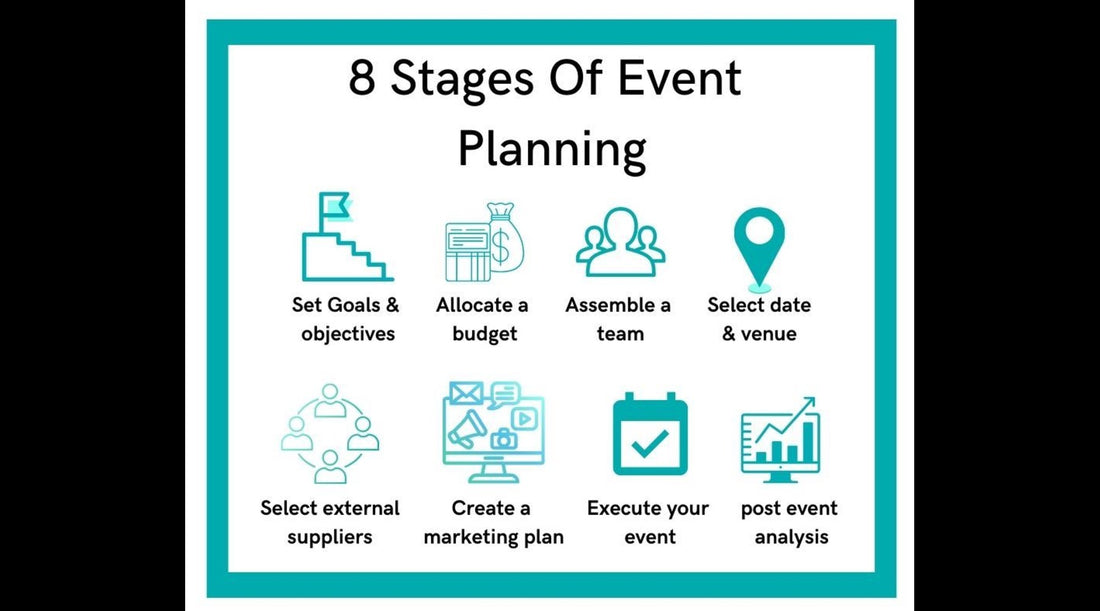
Managing Event Logistics: A Step-by-Step Guide for Corporate Planners
Share
Successful corporate events don't just happen by chance; they require meticulous planning and flawless execution of logistics. From venue selection to transportation arrangements, managing event logistics is a complex but crucial aspect of event planning. In this comprehensive guide, we'll walk you through the step-by-step process of managing event logistics to ensure your corporate event runs smoothly from start to finish.
-
Define Event Objectives and Requirements: Before diving into logistics planning, it's essential to clearly define the objectives and requirements of your corporate event. Determine the event's purpose, target audience, budget, and desired outcomes. Understanding these key factors will guide your logistical decisions and ensure alignment with your overarching goals.
-
Establish a Timeline and Milestones: Create a detailed timeline outlining key milestones and deadlines for each stage of the planning process. Start with the event date and work backward, allocating sufficient time for tasks such as venue selection, vendor contracts, guest RSVPs, and promotional activities. A well-defined timeline will help you stay organized and ensure timely execution of logistics tasks.
-
Select an Appropriate Venue: Choose a venue that aligns with the size, style, and objectives of your corporate event. Consider factors such as capacity, location, amenities, and accessibility for attendees. Schedule site visits to evaluate potential venues firsthand and confirm that they meet your event requirements. Negotiate contracts with the venue to secure dates, pricing, and any additional services or accommodations needed.
-
Secure Necessary Permits and Licenses: Depending on the nature and scale of your event, you may need to obtain permits or licenses from local authorities or regulatory agencies. Research and identify any legal requirements or restrictions related to your event, such as alcohol permits, parking permits, or noise ordinances. Begin the permit application process well in advance to allow sufficient time for approval and compliance.
-
Coordinate Vendor Partnerships: Identify and contract with vendors who will provide essential services and supplies for your event, such as catering, audiovisual equipment, decor, and transportation. Request detailed proposals from potential vendors, comparing pricing, offerings, and references before making final selections. Clearly communicate your expectations, timelines, and deliverables to ensure seamless collaboration with vendors throughout the planning process.
-
Develop a Comprehensive Event Plan: Create a detailed event plan that outlines all logistical aspects, including setup and breakdown schedules, seating arrangements, signage placement, and emergency procedures. Distribute the event plan to key stakeholders, vendors, and staff members involved in executing the event to ensure everyone is aligned and aware of their responsibilities.
-
Implement Technology Solutions: Utilize event management software or technology platforms to streamline logistical tasks such as registration, ticketing, attendee tracking, and communication. Leverage digital tools for managing event budgets, timelines, and task assignments to enhance efficiency and organization. Incorporate mobile apps or virtual event platforms to facilitate engagement and interaction among attendees in both in-person and virtual settings.
-
Conduct Rehearsals and Walkthroughs: Schedule rehearsals and walkthroughs to familiarize event staff and volunteers with their roles and responsibilities and ensure that all logistical elements are in place. Conduct a comprehensive walkthrough of the event venue to identify any potential issues or areas for improvement. Use this opportunity to test audiovisual equipment, lighting, and other technical components to troubleshoot any issues before the event begins.
-
Execute Contingency Plans: Prepare contingency plans for unforeseen circumstances or emergencies that may arise during the event, such as inclement weather, technical glitches, or medical emergencies. Designate a dedicated team or point person responsible for managing and executing contingency plans as needed. Communicate contingency procedures to all event staff and volunteers to ensure a coordinated response in the event of an emergency.
-
Evaluate and Debrief: After the event concludes, conduct a comprehensive evaluation and debriefing session to assess the success of the logistics plan and identify areas for improvement. Solicit feedback from attendees, staff, vendors, and other stakeholders to gain insights into what worked well and where there may be opportunities for enhancement. Use this feedback to inform future event planning efforts and refine your logistical approach.
Managing event logistics requires careful planning, attention to detail, and effective coordination of various moving parts. By following this step-by-step guide, corporate planners can navigate the complexities of logistics planning with confidence and ensure that their events are executed seamlessly from conception to execution. From defining objectives and securing venues to coordinating vendor partnerships and implementing technology solutions, mastering event logistics is essential for delivering memorable and successful corporate events
